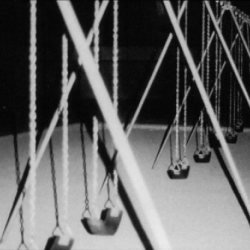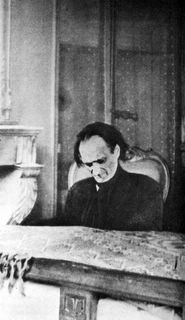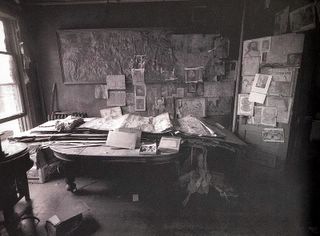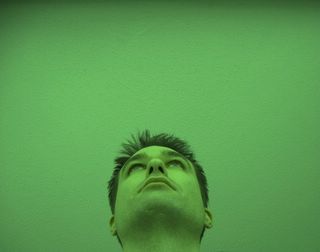A harried looking man crouches on a bench on the bustling Nicollet Mall in downtown Minneapolis. Mr. Scorgel. He almost looks like a cartoon; face drawn tight in a horrific mask, eyes red and puffy, his blond hair pushed straight up off a high forehead. He looks as though he’s on a drug binge or a four day drunk, but he’s dressed impeccably, which is so incongruous that you realize his struggle is of a different nature. Perhaps he sees ghosts streaming down the crowded mall, or hears banshees screaming in the alleys. It is everything he can do from springing out of the bench and running for his life. He has been told none of it is real. He begins to doubt this explanation, however, as the specters crowd around him. Lucky he has a small fortune in the bank account and personal assistants that get him dressed in the morning, push him out of the rooms of his penthouse condo on Loring Green, or else he would likely fall into a Hughsesque hibernation, cloistered behind his wealth.
Really, his help just want him out of the house so they can kick back in his luxury and enjoy the high life. The butler gets drunk on cognac in the library, and the maid dresses up in the dead wife’s evening gowns and parades about the chandeliered dining hall, entertaining an imaginary party of society’s elite. Maybe she sees the same specters as our Mr. Scorgel, only her specters laugh shrilly at the maid’s banter, and the ghost-gentlemen toast her elegance and beauty. Down in the private garage, the driver entertains the latest runaways he has transported from Loring Park in Mr. Sorgel’s Bentley. Cries and struggles muted by cinder block walls, the driver does his best to deflect the arterial spray from the tan leather seats. It doesn’t really matter. Any stains are answered for with an annoyed roll of his eyes; “Looks like Master Scorgel has spilled his cognac again.”
Now as we look upon Mr. Scorgel crouched on his bench near a bus stop, surrounded by shopping bags from Ralph Lauren, William Sonoma, Neiman Marcus, we interpret this look of utter horror in his eyes perhaps not from schizophrenic visions, but just maybe the harsh light of awareness. Maybe he knows exactly what happens back in his high-rise of iniquity.
Tuesday, September 27, 2005
Sunday, September 18, 2005
Killroy Lives!

Killroy swung here.
I remember a day when I walked to elementary school with my friend David Herricks, otherwise known as “Butt”, and saw a 1950’s style Ranch house with several police cars in the driveway. A crowd of other kids on the way to school gathered at the curb across the street. An ambulance slowly pulled away, without its lights on. Coming out the front door, cops wheeled a young guy in a wheelchair, maybe eighteen years old, hands handcuffed and resting in his lap. Everybody was talking about it at school that day. Killroy, crippled on this very same playground years ago. Killed his dad with a shotgun.
A few days later the words KILLROY LIVES! was found spraypainted on the school wall. All of us kids felt a kind of liberation over the murder. In our minds it must have been a justified killing, the age-old story of a son rising up against the father, and we imagined it had been us. Years of your dad making fun of you because you’re in a wheelchair, always calling you a cripple and why couldn’t those high-bars have just killed you rather than breaking your back, and the pain and the constant taunting builds a pressure greater than the pain, the anger lifts you up and helps you pull the trigger, and that power of gunpowder and lead feels wonderful in the arms of a boy not too crippled to kill his rotten dad. And us school kids gather outside with our school bags and lunch boxes to watch him wheel down the sidewalk into a squad car, and across the yards we hear the school bells ring and we run off to class elated and exploding with excitement. Killroy lives. The guy in the wheelchair, who once swung on these bars and ran through this sandbox only to end up in a wheelchair, now raised above us all into local folklore, a legend, a myth to be spray painted on the walls of our school.
Saturday, September 03, 2005
Stalked by the Muses
Where did you go, Artaud? I’ll find you, in the flash of lightning behind these nighttime storm clouds, I will spot your pale face watching me from the corner of a building. Perhaps you have climbed to the top of the church bell tower and hang out from a turret, your face pelted with the cold wind, those black eyes swallowing the raindrops like the depths of a well.

Antonin Artaud in his room, shortly before his death.
I stepped away from the window. I didn’t like the impression of being watched by my muse, on a night like this. Could there have been other muses, though, laying in wait for me, muses which I had least suspected? For years I had toyed with the idea of a very innocuous man, a kind of naïve and innocent figure in an inconspicuous job, like a park maintenance man or a janitor, carrying around in his mind the most vibrant, magical world. I hadn’t known that he was out there, in real life, mopping the floors of a nun’s dormitory, then walking the few blocks to his one room apartment in Chicago, to draw his pictures of the Vivian girls and their holy war against the men who enslaved children. Henry Darger was his name, and this private little man typed out on his manual typewriter a fifteen-thousand page novel. His neighbor thought Henry always had company over, because he could hear a din of voices coming from behind the closed doors. It wasn’t until later that he realized these were each spoken by Darger himself, speaking in different voices, like the nagging voices of nuns perhaps replayed in the stage of his room.

Darger's Room
Henry’s world lures me. The inviting haven of a small room that looks upon kingdoms, a tower above forests, a cave in the cliffs by the sea shores, where ghost ships slide across the horizon. Yes, this room is Darger’s, and perhaps this is the medium in which this muse seduces me. Darger’s Room. Can it be found in the smudged antique mirror above the radiator, and I might climb through? Can in be found behind the unhinged door of the clothes dryer, a little tunnel opening up upon his hardwood floors and walls of water colors depicting the great wars, the little girls sprouting wings from their backs and ram horns from their hair?

Darger Painting
I went to the kitchen, dug through the junk drawer for the box of wooden matches. I struck one on the side of the box, watched the explosion of sulfer and then the dry wooden match catch light. I lit a Mexican cocoa candle and crossed to the chair by the widow. I looked out over the night. I slid open the window. Cold night air. Rain. Flash of lightning. I climbed up on the sill, looked down for only a moment but was more transfixed by what looked like unchartered lands behind the clouds, revealed in the silver flash of lightning. Great valleys and fjords in the sky. I stepped out, some would say to my death, but others might believe I stepped out to my life. This was Darger’s Room, after all, where anything could happen. I became a great dragon writhing across the skies, frightening children that gathered by their bedroom windows in the dark, who thought they would only see lightning in the sky. I entwined my tail around the hidden moon to anchor me in these storm winds. I breathed fire down into the alleys where Artaud crept, scared him out of hiding like a mouse from the brambles. Can a ghost fear death? In Darger’s Room, perhaps. But I wasn’t sure if that scream coming from the room was Artaud’s, or just another voice of Darger’s din.
See here, Artaud, you’re not going to suck me in again. Darger’s Room doesn’t exist. All I want to do tonight is watch a movie. Your thunderstorm outside is just a distraction; this “dark and stormy night” will not lull me into the dream, this candle’s perfume will not intoxicate me.
And there he stood, in the darkened hallway, a figure in black, a ghostly face, black pools of eyes, his hands stuffed into his pockets, thankfully, for I don’t think I could handle it if I saw those pallid claws. By his heaving chest and purple smirk upon his lips, I could tell he was laughing, silently. Did Darger steal his voice?
“No, a real artist never loses their voice, at least not completely,” Artaud said. His voice reverbrated throughout the room, deep like a base cord struck in a cloister. “That is what I hope to show you, for you have forgotten you’re an artist.”
Christ, would he ever let up? I sat back in the chair and rolled my eyes. When did the laptop settle across my thighs? The heat of it emanated like a coal, the warm glow of the LCD screen on my face. The keys were so tempting beneath my finger tips, but I new what kind of struggle awaited me if I even began to tap out letters forming words forming sentences that lead one astray, that circled round on each other until you found yourself lost in one of Borge’s labyrinths.
“I don’t know what to write,” I said. I had not been able to mask the childlike fear in my voice.
“Remember the days when you were still just a teenager, and you would stay up until the early morning, laboring away at a single paragraph? You never wasted words then; you wrote as though a man starting out on a trek across a desert conserves his water. You’ll know what to write if you just quiet your heart and mind and listen.”
“Listen?”
“Yes, to the silence.”
“And hear what, Darger’s voices?”
“Perhaps,” Artaud answered, and receaded back into the darkness of the hall, and with a discrete bow, was gone.
Silence, I thought. Would I ever slow down this pounding heart, ever quiet this unraveling mind? I closed the the laptop, heard the hard drive shut down, heard the miniature heating fan slow to a halt, and then the sudden pervasive silence. Satisfied that I had exorcised my muses for the evenings, I withdrew to my bedroom, drew back the blankets, slid off my clothes and slid into the cool sheets and a night of dreams I would hopefully forget by morning.

Antonin Artaud in his room, shortly before his death.
I stepped away from the window. I didn’t like the impression of being watched by my muse, on a night like this. Could there have been other muses, though, laying in wait for me, muses which I had least suspected? For years I had toyed with the idea of a very innocuous man, a kind of naïve and innocent figure in an inconspicuous job, like a park maintenance man or a janitor, carrying around in his mind the most vibrant, magical world. I hadn’t known that he was out there, in real life, mopping the floors of a nun’s dormitory, then walking the few blocks to his one room apartment in Chicago, to draw his pictures of the Vivian girls and their holy war against the men who enslaved children. Henry Darger was his name, and this private little man typed out on his manual typewriter a fifteen-thousand page novel. His neighbor thought Henry always had company over, because he could hear a din of voices coming from behind the closed doors. It wasn’t until later that he realized these were each spoken by Darger himself, speaking in different voices, like the nagging voices of nuns perhaps replayed in the stage of his room.

Darger's Room
Henry’s world lures me. The inviting haven of a small room that looks upon kingdoms, a tower above forests, a cave in the cliffs by the sea shores, where ghost ships slide across the horizon. Yes, this room is Darger’s, and perhaps this is the medium in which this muse seduces me. Darger’s Room. Can it be found in the smudged antique mirror above the radiator, and I might climb through? Can in be found behind the unhinged door of the clothes dryer, a little tunnel opening up upon his hardwood floors and walls of water colors depicting the great wars, the little girls sprouting wings from their backs and ram horns from their hair?

Darger Painting
I went to the kitchen, dug through the junk drawer for the box of wooden matches. I struck one on the side of the box, watched the explosion of sulfer and then the dry wooden match catch light. I lit a Mexican cocoa candle and crossed to the chair by the widow. I looked out over the night. I slid open the window. Cold night air. Rain. Flash of lightning. I climbed up on the sill, looked down for only a moment but was more transfixed by what looked like unchartered lands behind the clouds, revealed in the silver flash of lightning. Great valleys and fjords in the sky. I stepped out, some would say to my death, but others might believe I stepped out to my life. This was Darger’s Room, after all, where anything could happen. I became a great dragon writhing across the skies, frightening children that gathered by their bedroom windows in the dark, who thought they would only see lightning in the sky. I entwined my tail around the hidden moon to anchor me in these storm winds. I breathed fire down into the alleys where Artaud crept, scared him out of hiding like a mouse from the brambles. Can a ghost fear death? In Darger’s Room, perhaps. But I wasn’t sure if that scream coming from the room was Artaud’s, or just another voice of Darger’s din.
See here, Artaud, you’re not going to suck me in again. Darger’s Room doesn’t exist. All I want to do tonight is watch a movie. Your thunderstorm outside is just a distraction; this “dark and stormy night” will not lull me into the dream, this candle’s perfume will not intoxicate me.
And there he stood, in the darkened hallway, a figure in black, a ghostly face, black pools of eyes, his hands stuffed into his pockets, thankfully, for I don’t think I could handle it if I saw those pallid claws. By his heaving chest and purple smirk upon his lips, I could tell he was laughing, silently. Did Darger steal his voice?
“No, a real artist never loses their voice, at least not completely,” Artaud said. His voice reverbrated throughout the room, deep like a base cord struck in a cloister. “That is what I hope to show you, for you have forgotten you’re an artist.”
Christ, would he ever let up? I sat back in the chair and rolled my eyes. When did the laptop settle across my thighs? The heat of it emanated like a coal, the warm glow of the LCD screen on my face. The keys were so tempting beneath my finger tips, but I new what kind of struggle awaited me if I even began to tap out letters forming words forming sentences that lead one astray, that circled round on each other until you found yourself lost in one of Borge’s labyrinths.
“I don’t know what to write,” I said. I had not been able to mask the childlike fear in my voice.
“Remember the days when you were still just a teenager, and you would stay up until the early morning, laboring away at a single paragraph? You never wasted words then; you wrote as though a man starting out on a trek across a desert conserves his water. You’ll know what to write if you just quiet your heart and mind and listen.”
“Listen?”
“Yes, to the silence.”
“And hear what, Darger’s voices?”
“Perhaps,” Artaud answered, and receaded back into the darkness of the hall, and with a discrete bow, was gone.
Silence, I thought. Would I ever slow down this pounding heart, ever quiet this unraveling mind? I closed the the laptop, heard the hard drive shut down, heard the miniature heating fan slow to a halt, and then the sudden pervasive silence. Satisfied that I had exorcised my muses for the evenings, I withdrew to my bedroom, drew back the blankets, slid off my clothes and slid into the cool sheets and a night of dreams I would hopefully forget by morning.
Subscribe to:
Comments (Atom)
